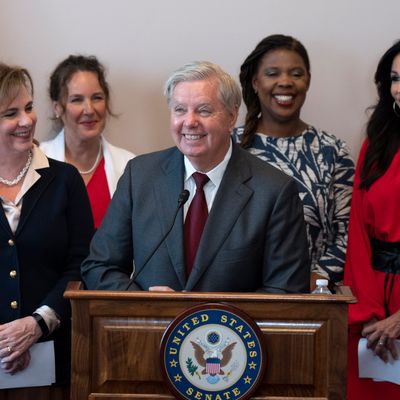
For the anti-abortion movement, 2022 was an epochal year, with its longtime goals, the reversal of Roe v. Wade and the abolition of federal constitutional abortion rights, accomplished in one fell swoop in the Dobbs Supreme Court decision. And the rush of Republican-controlled state legislators to enact newly available abortion restrictions was very exciting to those who spent decades struggling to find small cracks in the legal edifice created by Roe.
But the grassroots political backlash to these developments has to have been alarming to anti-abortion activists as they watched their long-time vassals in the Republican Party dance away from the aggressive steps to ban abortions everywhere that they had implicitly and explicitly promised to pursue once Roe went down. When Lindsey Graham tried to force a vote on a national 15-week abortion ban in the Senate in September, midterm-conscious Republican politicians all but shouted him down. By November, abortion-rights advocates had won ballot tests over laws in six states (Kansas, Kentucky, Vermont, California, Michigan, and Montana). And without question, the abortion backlash was a significant — maybe the most significant — factor in the underperformance of Republicans in the midterms.
Now divided government in Washington will paralyze policy-making on abortion and nearly every other issue for the next two years. So all eyes are on 2024, and worried anti-abortion activists are making it clear they will use all the leverage they can to reimpose their views on the GOP via litmus tests on Republican presidential candidates. As Politico reports, demand No. 1 will likely be the kind of national abortion ban Graham proposed to the horror of most of his colleagues:
Anti-abortion advocates are insisting on more in a post-Roe era — namely, a hard commitment to back a federal abortion ban — and they’re holding out until they get it.
That means potential Republican presidential hopefuls — such as Trump and Florida Gov. Ron DeSantis, whose state’s 15-week abortion ban would have been at the leading edge of the anti-abortion movement a year ago — enter the 2024 cycle under pressure to go farther. There’s already a range of policy positions across the potential GOP field, from former Vice President Mike Pence’s support for a national abortion ban to former U.N. Ambassador Nikki Haley’s recent remarks that abortion should remain a state issue, and most have not yet detailed the exact anti-abortion policies they would push if elected.
That will change assuming there really is a big, brawling competition for the 2024 GOP nomination full of candidate forums and dominated in some key states by activists who eat, breathe, and sleep abortion politics above all (such as Iowa, which among Republicans will remain the first contest of 2024 no matter what Democrats do). And despite the deep appreciation the forced-birth crowd has for what Donald Trump did to help bring down Roe and the powerful head of steam Ron DeSantis has built up if he decides to challenge the 45th president, no candidate will get to skip a tough abortion litmus test, or ignore demands to talk about the subject early and often.
“Look, I’m appreciative of everything [Trump] put in place,” Tony Perkins, the president of the Family Research Council, told POLITICO. “Evangelical voters and conservative voters have great admiration and appreciation for him, but they still want a vision cast for the future and they don’t want to go through four years of relitigating 2020.”
Trump didn’t once mention abortion or the fall of Roe in his grievance-laden speech announcing his 2024 campaign, sparking conservative concerns that he won’t prioritize the issue in a third White House bid.
DeSantis has been a bit dodgy, pushing through his legislature a 15-week ban with no exceptions but (so far) resisting demands to go farther now that he stands athwart Florida like a political colossus. But he and other potential presidential candidates will definitely have to take a stand on a national ban, which is not a theoretical matter since a very good Republican year in 2024 could give the GOP trifecta control in Washington. Certainly the topic will come up in the early and pivotal 2024 primary in South Carolina, Lindsey Graham’s state, where a potential presidential candidate, former governor Nikki Haley, has taken the position that abortion is exclusively a state issue. Here’s what Graham told Politico about that:
“Each person running for the White House will have to come up with an answer to the question, post-Dobbs: ‘Should we consider this a states rights issue or a human rights issue?’” Graham said in an interview. “The pro-life community is still a strong component of the Republican Party and if you’re running for president, I think in certain states, like South Carolina, the position that the unborn have no voice in our nation’s capital will be a tough sell for the pro-life community.”
At present the only potential 2024 Republican presidential candidate who is golden with the anti-abortion lobby is former vice-president Mike Pence, the conservative evangelical stalwart who has long favored a very tight national ban on abortions. Assuming he runs (which he’s giving every indication of doing) Pence will significantly ramp up the pressure on his rivals to commit to a federal ban on the strictest possible terms.
Will any potential GOP president look at some general-election polls and dare to push back on these demands? It’s an interesting question. The pro-choice wing of the Republican Party has been moribund for decades. But 2022 votes in Kansas and elsewhere have shown there are Republican voters who haven’t bought into anti-abortion extremism once it actually matters in terms of the law of the land. In any event, the national GOP’s position on the fraught subject will be tested as never before in 2024.
More on life after roe
- ERA Ratification Is Now Up to Trump’s Supreme Court
- The Unlikely Reason RFK Jr. Could Be Rejected by the Senate
- Project 2025’s Mastermind Is Obsessed With Contraception






























